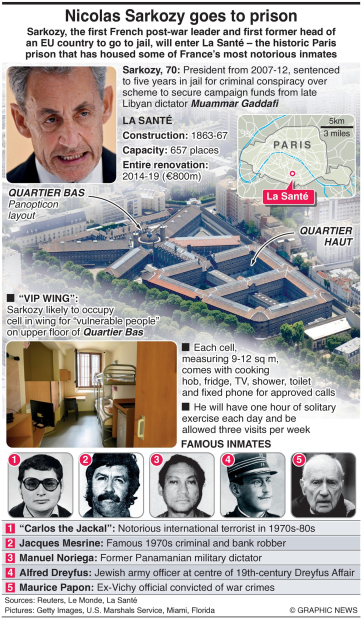Former French president Nicolas Sarkozy began a five-year sentence yesterday for conspiring to raise campaign funds from Libya, arriving at La Sante prison in Paris in a stunning downfall for a man who led the country between 2007 and 2012.
The former conservative president, 70, left his home for the car journey to the prison, walking hand in hand with his wife Carla Bruni and cheered by a crowd of supporters chanting ‘Nicolas, Nicolas’ and singing La Marseillaise national anthem.
Sarkozy, who was convicted and sentenced last month, is the first former French leader to be jailed since Nazi collaborator Marshal Philippe Petain after the Second World War.
Shortly after he headed for La Sante, Sarkozy published a long message on X in which he claimed to be a victim of revenge and hatred.
“I want to tell (French people), with the unshakable strength that is mine, that it is not a former president of the republic who is being imprisoned this morning – it is an innocent man,” he said.
Sarkozy’s conviction capped years of legal battles over allegations that his 2007 campaign took millions in cash from Libyan leader Muammar Gaddafi, who was later overthrown and killed during the Arab Spring uprisings.
While Sarkozy was found guilty of conspiring with close aides to orchestrate the scheme, he was acquitted of personally receiving or using the funds.
He has consistently denied wrongdoing and has called the case politically motivated.
His lawyers said they had filed a request for early release, pending his appeals trial, and that they expected this request to be reviewed in about a month.
They said they hoped they could get Sarkozy freed on early release by Christmas.
Sarkozy will likely be held in La Sante’s isolation unit, where inmates are housed in single cells and kept apart during outdoor activities for security reasons.
Conditions are similar to the rest of the prison: cells measure 9sqm to 12sqm and, following renovations, now include private showers.
Sarkozy will have access to a television – for a monthly fee of 14 euros ($16) – and a landline telephone.



&uuid=(email))